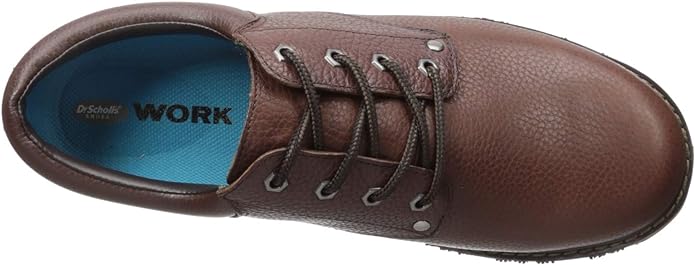Waiters play a crucial role in the hospitality industry, requiring them to be on their feet for long hours, often in high-pressure environments. It is, therefore, essential for waiters to have comfortable and durable shoes that can withstand the demands of their job. This paper aims to delve into the importance of comfort and durability in waiter shoes and explore the features that contribute to these qualities.

I. The Significance of Comfort in Waiter Shoes
A. Understanding the physical demands of the job
Understanding the physical demands of the job is crucial in determining the significance of comfort in waiter shoes. Waiters are required to be on their feet for long hours, constantly moving and performing tasks such as walking, standing, and carrying trays. These activities can place significant strain on the feet, leading to fatigue and discomfort if proper support and cushioning are lacking.
To address these challenges, waiter shoes should provide adequate cushioning and support to alleviate pressure points and prevent foot fatigue. One important feature in achieving this is the incorporation of arch support. Arch support helps maintain the natural alignment of the foot, reducing strain on the arches and preventing conditions such as plantar fasciitis. By providing proper support to the arches, waiter shoes can significantly enhance comfort and alleviate foot pain.
B. The role of ergonomic design
In addition to arch support, the role of ergonomic design features in waiter shoes cannot be underestimated. Shock absorption is another key element that contributes to overall comfort. The constant impact of each step can place stress on joints, leading to discomfort and even potential injuries. Waiter shoes with shock-absorbing properties help minimize this impact by absorbing and dispersing the forces exerted on the feet. This not only reduces the stress on joints but also provides a more comfortable walking experience for waiters.
Proper ventilation is also an important aspect of comfort in waiter shoes. The nature of the job often results in sweaty feet, which can lead to the development of blisters and unpleasant odors. Waiter shoes with proper ventilation features, such as breathable materials or mesh panels, allow air to circulate around the feet, keeping them dry and cool. By reducing moisture and preventing the accumulation of sweat, these shoes contribute to a more comfortable and hygienic experience for waiters.
In conclusion, the significance of comfort in waiter shoes cannot be overstated. Understanding the physical demands of the job and addressing them through the incorporation of ergonomic design features is essential. Arch support, shock absorption, and proper ventilation are key elements that enhance comfort in waiter shoes. By providing adequate support, cushioning, and breathability, these shoes can alleviate foot fatigue, reduce the risk of injuries, and ultimately improve the overall well-being and job performance of waiters.

II. Durability: A Vital Feature in Waiter Shoes
A. The harsh conditions of the hospitality industry
Waiters often work in demanding environments, being exposed to spills, slippery surfaces, and constant movement. As a result, their shoes must be able to withstand these conditions and maintain their structural integrity. Durability is especially crucial in preventing accidents and ensuring the longevity of the shoes.
B. Materials and construction techniques
Waiter shoes made from high-quality materials, such as genuine leather or durable synthetic materials, offer excellent durability. Leather shoes are particularly preferred due to their ability to withstand wear and tear and adapt to the individual’s foot shape over time. Additionally, reinforced stitching, strong soles, and slip-resistant outsoles contribute to the overall durability of waiter shoes.

III. The Impact of Comfort and Durability on Job Performance
A. Increased productivity and focus
Wearing comfortable shoes allows waiters to concentrate on their tasks instead of being distracted by foot pain or discomfort. When waiters are at ease, they can provide better customer service and maintain a positive attitude throughout their shift. Comfortable shoes also help alleviate physical strain, reducing the risk of fatigue, injuries, or mistakes.
B. Enhanced mobility and agility
Waiters often need to navigate through crowded spaces, maneuver around tables, and quickly respond to customers’ needs. Shoes that provide a good grip, flexibility, and stability enable waiters to move with ease, ensuring smooth and efficient service. Moreover, durable shoes that can withstand spills and slippery surfaces contribute to waiters’ safety, preventing accidents and injuries.

IV. The Role of Style and Professionalism in Waiter Shoes
A. Creating a polished and cohesive image
Waiter shoes, along with the overall uniform, contribute to the professional appearance of waitstaff. Shoes that are well-maintained, clean, and polished enhance the overall impression that customers have of the establishment. By investing in stylish and appropriate footwear, restaurants can create a positive perception and ensure that waiters look presentable and well-groomed.
B. Matching the ambiance and brand identity
Different restaurants have different styles and atmospheres, and waiter shoes should align with the establishment’s branding. For example, high-end restaurants may require formal and polished shoes, while more casual establishments may opt for comfortable yet stylish options. Selecting shoes that complement the ambiance and brand identity ensures a cohesive and professional image for the restaurant.
Comfort and durability are crucial features in waiter shoes, as they play a significant role in the well-being and job performance of waitstaff. By prioritizing these qualities and considering the ergonomic design, materials, and construction techniques, restaurants can provide their employees with shoes that enhance comfort, promote safety, and uphold a professional image. Additionally, investing in high-quality waiter shoes not only benefits the waitstaff but also contributes to the overall success and reputation of the establishment.
